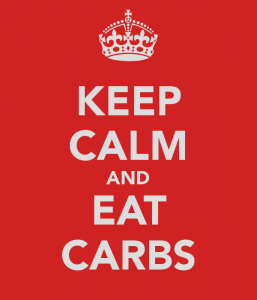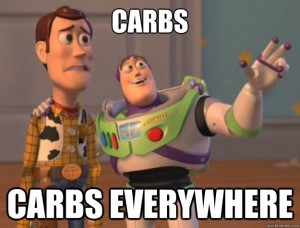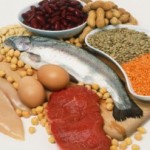When To Eat Carbs
 There seems to be a huge stigma around carbs with people who are looking to lose weight. I dont know how it happened – maybe it was the Atkins diet that got everyone scared of them, by at any rate…people still avoid them like the plague when trying to lose weight when in reality, it could be preventing you from reaching your goal as quickly as you would have liked.
There seems to be a huge stigma around carbs with people who are looking to lose weight. I dont know how it happened – maybe it was the Atkins diet that got everyone scared of them, by at any rate…people still avoid them like the plague when trying to lose weight when in reality, it could be preventing you from reaching your goal as quickly as you would have liked.
So I wanted to debunk a few myths and at the same time offer some advice on WHEN to eat carbs and WHAT TYPE of carbs to eat at those times to maximize your results. So enough with the jibba jabba…Lets break it down!
The Importance of Carb Intake
Carbohydrates are one of the three main macronutrients (which I will refer to as macros from here on out), which anyone who is tracking their nutrition, needs to be aware of. The reason being is because the amount of carbs we consume depending on your goals, will vary way more than the amounts of fat or protein in your nutrition plan.
For example: During a bulking or cutting period the amounts of fat and even protein are pretty much standard for most nutrition plans. However, your carb intake could be super high while bulking or even zero in some cases where people are doing a keto diet.
So this is why I think carb intake is the hardest puzzle to solve out of the three macros. There are so many theories about what kinds of carbs we should have. Some “experts” claim that simple carb intake is good, since it leads to insulin release from the pancreas and insulin is one of the most powerful anabolic hormones. But then there are equally credible “experts” who disagree and say that a high simple carb intake leads to the deposit of a lot of under skin fat.
So I will give you my opinion on this, which is somewhere in the middle of the two theories. First of all though, I want to make clear that my suggestion for managing your carb intake will be mostly for maintaining a lean physique all year round and not so much for cutting or bulking. If you are just now learning about how carb intake can effect your results, it would be good to start out by understanding what simple and complex carbs are.
Now to the nitty gritty!
WHEN To Eat Carbs & What TYPE
NOTE** The main factor which determines whether carbs are simple or complex, is the glycemic index. The higher it is, the faster carbs turn into glucose and are assimilated by your body. The maximum glycemic index for natural foods is 100.
Now that we made that clear, let’s begin with the first meal of the day.
At breakfast it’s good to have a combination of simple (fast) carbs WITH complex carbs and some fiber. The reason for having fast carbs here is because protein (which we’ll be having in the morning) should be digested quickly. Those fast carbs will help your body to transport and absorb that protein quicker and get your body out of a catabolic state after a long nights sleep.
All following meals before working out should contain only complex carbs. This type of carb is assimilated into your body slowly, but continuously provides energy to your muscles.
Now on to pre-workout! Most people would take simple carbs before working out since they are looking for a quick energy boost. That is NOT the way to go because if you have too many simple carbs, then during insulin release – your body will become loose and you will start feeling sleepy relaxed (doesnt really promote “BRINGIN IT”). Rather, take a scoop of protein whey 30 minutes prior to your workout which will provide your muscles with high quality BCAAs for muscle recovery and it wont bog you down!
You DO need simple carbs right after working out though.
 The reason for this is the depletion of muscle and liver glycogen stores during physical exercise. In order to recharge that glycogen loss after working out its a good idea to have simple carbs. For those that dont know, glycogen is something like stored carbs, which we keeps in the muscle tissue and mostly in the liver and our body uses these as a main energy source during aerobic or anaerobic exercise. The best thing I have found for after a workout is the P90X recovery drink or an alternative that I show you how to make here. With a recovery drink you are looking for a 4:1 ratio of simple carbs to protein. 40g of simple carbs and 10g or fast absorbing protein is perfect!
The reason for this is the depletion of muscle and liver glycogen stores during physical exercise. In order to recharge that glycogen loss after working out its a good idea to have simple carbs. For those that dont know, glycogen is something like stored carbs, which we keeps in the muscle tissue and mostly in the liver and our body uses these as a main energy source during aerobic or anaerobic exercise. The best thing I have found for after a workout is the P90X recovery drink or an alternative that I show you how to make here. With a recovery drink you are looking for a 4:1 ratio of simple carbs to protein. 40g of simple carbs and 10g or fast absorbing protein is perfect!
The second meal after working out could also contain carbs with higher glycemic index foods, but still should be lower than the previous meal. The reason for this is that you can afford to increase insulin here a little bit, due to the fact that your metabolism is sped up for about 4 hours after working out and there is a smaller chance of carbs turning into fat during that period. If you are having complex carbs such as brown rice, whole grain spaghetti or sweet potatoes in all of your other meals, then here you could have white rice, spaghetti or regular potatoes for example.
In all following meals we should have complex carbs again, with the only exception being the last meal. Right before bedtime there should be no carbs at all. There are a couple of reasons for this:
- If we have consumed carbs before going to bed, then most of them will deposit as fat while your body is in a sort of standby state and your metabolism is low.
- Carbs eaten right before bed can actually obstruct the release of growth hormone, which has a big impact on muscle growth and recovery and also on burning fat.
WHEN To Eat Carbs Wrap Up
- Your first meal has to contain complex carbs in combination with a small amount of fast carbs.
- All other pre-workout meals should contain complex carbs.
- The post workout meal should contain simple carbs and the next one should also have simple carbs but with a lower glycemic index.
- All following meals should have complex carbs, except the last meal for the day which shouldn’t contain any carbs at all before going to bed.
I hope these tips on when to eat carbs provided you some value! Its my goal to make resources that are practical and useful so that ANYONE can succeed with their nutrition and fitness. Do me a favor if you enjoyed this article: click the LIKE & SHARE icons on the left there and share this article. It will no doubt help others if it helped you! I appreciate your help!
Want to know exactly what’s in my cupboards and how I eat day-to-day to stay on track? I teach you in my FREE 5 Day Bootcamp. I will not only teach you the HOW of getting extreme results, but you are actually going to learn how to PREVENT FAILURE! So enter your name and best email HERE to get your Day-1 Video right NOW!
Now its time to BRING IT & inspire others to do the same!
Coach Todd
Related Posts















Recent Comments